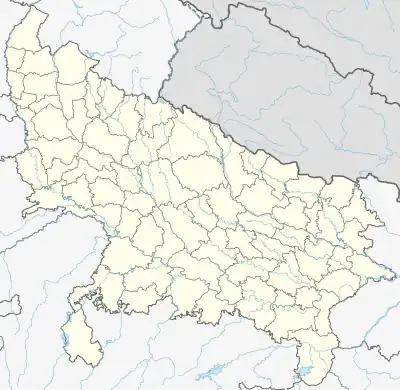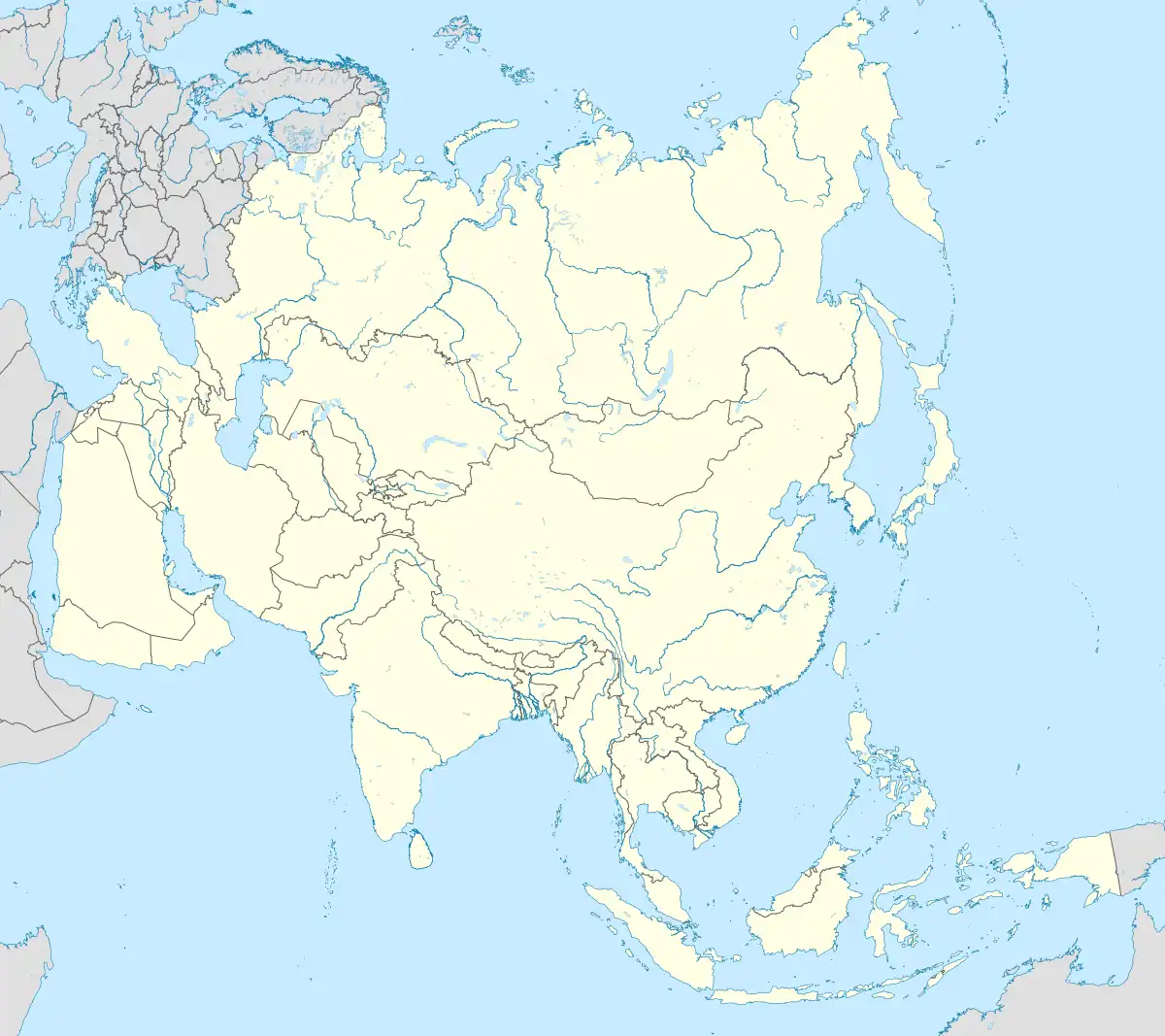Gahmar
Gahmar is a village in India, located near the Ganges river in the Ghazipur district in the state of Uttar Pradesh. The village is 38 km from Ghazipur. The village has two post offices, and one Panchayat Bhawan.[3] Gahmar is also known as the "Village of Soldiers".[4][5]
Gahmar | |
|---|---|
Village | |
 Gahmar Location in Uttar Pradesh, India  Gahmar Gahmar (India)  Gahmar Gahmar (Asia) | |
| Coordinates: 25.497°N 83.822°E | |
| Country | |
| State | Uttar Pradesh |
| District | Ghazipur |
| Established | 1530 |
| Founded by | Maharaja Dham Dev Singh |
| Government | |
| • Type | Sarpanch (Pradhan) |
| • Body | Gram panchayat |
| Area | |
| • Total | 1,766 ha (4,364 acres) |
| Population (2011)[1] | |
| • Total | 25,994 |
| • Density | 1,500/km2 (3,800/sq mi) |
| Language | |
| • Official | Hindi[2] |
| • Additional official | Urdu[2] |
| Time zone | UTC+5:30 (IST) |
| PIN | 232327 |
| Telephone code | 05497 |
| Vehicle registration | UP, 61 |
| Nearest city | Zamania |
| Sex ratio | 1000/913 ♂/♀ |
| Lok Sabha constituency | Ghazipur |
| Vidhan Sabha constituency | Zamania |
| Civic agency | Gahmar |
| Climate | Normal (Köppen) |
History
Gahmar was settled by Sakarwar Rajputs, the descendants of Dham Deo Misir who came from the vicinity of Fatehpur Sikri after Babur captured it in 1527 AD. They are closely related to the Sakarwar Bhumihars and Kamsar Pathans, the descendants of Dham Deo Misir's brother Maharaja Kam Dev Misir. After moving east from Fatehpur Sikri, initially, both of them settled in Sakradih, but due to floods, Dham Deo migrated to Maa Kamakhya Dham near Gahmar and Kam Deo settled in Reotipur. Dham Dev had two sons—Roop Ram Rao and Diwan Ram Rao. One of Roop Ram's son, Sainu Mal Rao and his descendants settled largely in Gahmar. By 1800 AD, 23 patties in Gahmar were established by the clan members.[6]
Demographics
As of 2011 Indian Census, Gahmar had a total population of 25,994, of which 13,367 were males and 12,627 were females. Population within the age group of 0 to 6 years was 3,650. The total number of literates in Gahmar was 17,108, which constituted 65.8% of the population with male literacy of 74.0% and female literacy of 57.1%. The effective literacy rate of 7+ population of Gahmar was 76.6%, of which male literacy rate was 86.4% and female literacy rate was 66.2%. The Scheduled Castes and Scheduled Tribes population was 3,295 and 327 respectively. Gahmar had 4365 households in 2011.[1] The main population of Gahmar lived in an area of 476 acres.[7]
Transport
Railways
Gahmar has a railway station connected to Patna and Pandit Deen Dayal Upadhyaya Junction railway station.
Roadways
Gahmar is situated on NH-124C which is connected to district headquarters Ghazipur, about 35 Km.
Places of interest
References
- "Census of India: Gahmar". www.censusindia.gov.in. Retrieved 28 February 2020.
- "52nd Report of the Commissioner for Linguistic Minorities in India" (PDF). nclm.nic.in. Ministry of Minority Affairs. Archived from the original (PDF) on 25 May 2017. Retrieved 4 January 2019.
- "Panchyati Raj, Ghazipur". panchayatiraj.up.nic.in/. Retrieved 24 January 2021.
- Rashid, Omar (4 March 2017). "This village by Ganga nurtures jawans". The Hindu. Retrieved 1 June 2023.
- Chakravarty, Saurabh (23 June 2022). "यूपी के गाजीपुर में सैनिकों के गांव गहमर के रणबांकुरों को पीएम नरेन्द्र मोदी की अग्निपथ योजना आई पसंद" [Ranbankurs of Gahmar village of soldiers in Ghazipur UP liked PM Narendra Modi Agneepath scheme jagran special]. Dainik Jagran (in Hindi). Retrieved 1 June 2023.
- Ansari, Saiyad Hasan (1986). Evolution and Spatial Organization of Clan Settlements: A Case Study of Middle Ganga Valley. Concept Publishing Company. pp. 103–106. Retrieved 15 February 2020.
- "Bhulekh". upbhulekh.gov.in. Retrieved 11 January 2021.
- "यहां साक्षात् होता है मां का चमत्कार, देखिए तस्वीरें..." Dainik Bhaskar. Retrieved 29 July 2022.
- Nandy, Asmita (24 May 2021). "Pandemic, Poverty, Rituals, Rumours: Why Ganga Flooded With Bodies". TheQuint. Retrieved 29 July 2022.